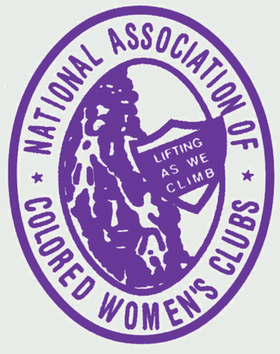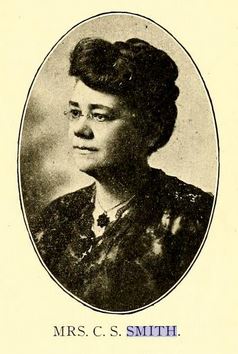
Roberta Johnson Dunbar (died November 1, 1956) was an American clubwoman and peace activist based in Rhode Island. Her first name is sometimes written "Reberta" in sources. [1]

Roberta Johnson Dunbar (died November 1, 1956) was an American clubwoman and peace activist based in Rhode Island. Her first name is sometimes written "Reberta" in sources. [1]
Roberta Johnson Dunbar was born at Narragansett Pier, Rhode Island, the daughter of Daniel and Louisa (Cartwright) Dunbar. [1]
From 1902 through 1905, and again in 1931, Roberta J. Dunbar was president of the Northeastern Federation of Colored Women's Clubs, a body of the National Association of Colored Women (NACW). [2] [3] [4]
In 1913, Dunbar was elected as a founding officer of the Providence, Rhode Island branch of the National Association for the Advancement of Colored People. [5] [6] She was also president of the Working Girls Club in Providence. [7]
In 1928. Dunbar was serving as president of the Rhode Island Federation of Colored Women's Clubs. [8] Dunbar chaired the NACW's Peace Department in the 1930s. She addressed the organization's 1937 national convention in Fort Worth, Texas on the topic, saying "We women want peace, and no woman of any nation is in a better position to bring this Era than the women of America." [9]
In 1950, she was elected by the Women's Newport League to be their delegate to the national NACW convention in Atlantic City. [10]
Dunbar died in 1956, at the Home for Aged Colored People in Providence. [11]

The National Association of Colored Women's Clubs (NACWC) is an American organization that was formed in July 1896 at the First Annual Convention of the National Federation of Afro-American Women in Washington, D.C., United States, by a merger of the National Federation of Afro-American Women, the Woman's Era Club of Boston, and the Colored Women's League of Washington, DC, at the call of Josephine St. Pierre Ruffin. From 1896 to 1904 it was known as the National Association of Colored Women (NACW). It adopted the motto "Lifting as we climb", to demonstrate to "an ignorant and suspicious world that our aims and interests are identical with those of all good aspiring women." When incorporated in 1904, NACW became known as the National Association of Colored Women's Clubs (NACWC).

Nathan Fellows Dixon was an attorney and bank president from Westerly, Rhode Island. The son of Nathan F. Dixon and father of Nathan F. Dixon III, he was best known for his service as a United States representative from Rhode Island from 1849 to 1851, and again from 1863 to 1871.

The 2012 United States presidential election in Rhode Island took place on November 6, 2012, as part of the 2012 United States presidential election in which all 50 states plus the District of Columbia participated. Rhode Island voters chose four electors to represent them in the Electoral College via a popular vote pitting incumbent Democratic President Barack Obama and his running mate, Vice President Joe Biden, against Republican challenger and former Massachusetts Governor Mitt Romney and his running mate, Congressman Paul Ryan.

Josephine Silone Yates was an American professor, writer, public speaker, and activist. She trained in chemistry and became one of the first black professors hired at Lincoln University in Jefferson City, Missouri. Upon her promotion, she became the first black woman to head a college science department. She may have been the first black woman to hold a full professorship at any U.S. college or university.
Mary Tucker Thorp (1899–1974) was a teacher, educator and school principal at the Rhode Island College. She chaired the committee which investigated and made recommendations for accreditation standards for preschool education and which were adopted in the State Board of Education Codes in 1954. She was the first Distinguished Professor of Rhode Island College and both the first residence hall and a Professorship at the school are named in her honor. She was inducted into the Rhode Island Heritage Hall of Fame in 1969.

The Northeastern Federation of Colored Women's Clubs (NFCWC) is an umbrella organization representing black women's clubs in the northeastern United States. The organization was affiliated with the National Association of Colored Women's Clubs (NACWC). It was the first umbrella organization for black women's clubs in the United States, predating the NACWC by a month. The motto of the club is "For God and Humanity".

Henry N. Jeter was a Baptist minister and social justice activist from Newport, Rhode Island. He was minister at Shiloh Baptist Church in Newport for 42 years before founding a pair of organizations seeking to aid poor, urban African Americans, the Pastors and Laymen's Humane and Reform Association and the Jeter Movement of Race Relations and Social Service.

Victoria Clay Haley, later Victoria Clay Roland, was an American suffragist, clubwoman, bank executive, and fundraiser based in St. Louis, Missouri and later in Chicago.

Christine Shoecraft Smith was an African-American community worker began her career as the assistant principal of the Alabama State Normal and Industrial School. She married an AME minister, who would become a bishop in the church and assisted him as the manager of the press organ of the Sunday School Union. She worked in many clubs and served as the 13th president of the National Association of Colored Women's Clubs (NACWC).
The Woman's Era Club was an African-American women's civic organization founded in Boston, Massachusetts, in between 1892 and 1894 by Josephine St. Pierre Ruffin. The Club was the first black women's club in Boston. The organization was especially well-known for the conflict caused when Ruffin attempted to desegregate the General Federation of Women's Clubs (GFWC) in 1900.
Ada Belle Dement was an American educator and clubwoman. In 1941, she became president of the National Association of Colored Women's Clubs (NACWC).

Sadie L. Adams was an African-American teacher, suffragist, and clubwoman. She was one of the first women to serve on an election board in Chicago and one of the founders of the Douglas League of Women Voters. In 1916, she served as a delegate from Chicago's first black suffrage organization, the Alpha Suffrage Club, to the National Equal Rights League conference. She was elected president of the Chicago and Northern District Association of Colored Women's Clubs in 1921, serving into 1934. She was also involved in various charity clubs and organizations that helped to engage women in war work during World War I, provide resources for underserved youth, and increase suffrage for Black women.

M. Cravath Simpson was an African-American activist and public speaker. After beginning her career as a singer, she studied to become a podiatrist, but is most known for her work to uplift the black community and combat lynching. Though she was based in Boston, Simpson spoke throughout the Northeastern and Midwestern United States urging recognition of the human rights of black citizens.

Fanny Purdy Palmer was an American author, poet, journalist, lecturer, social activist, and clubwoman. She began club work in 1876 and was one of the originators of the General Federation of Women's Clubs. She served as president of the Rhode Island Woman's Club, was a member of the school committee of the city of Providence, Rhode Island, and was connected with various philanthropic and social movements, including women's suffrage. A diligent reader of some of the best scientific and metaphysical works, for many years, she was a writer of stories which appeared in various weekly and monthly publications, stories which have dealt with the problems of life.

Sara MacCormack Algeo, born Sara Louisa MacCormack, was an American suffragist and educator.

Even before women's suffrage in Rhode Island efforts took off, women were fighting for equal male suffrage during the Dorr Rebellion. Women raised money for the Dorrite cause, took political action and kept members of the rebellion in exile informed. An abolitionist, Paulina Wright Davis, chaired and attended women's rights conferences in New England and later, along with Elizabeth Buffum Chace, founded the Rhode Island Women's Suffrage Association (RIWSA) in 1868. This group petitioned the Rhode Island General Assembly for an amendment to the state constitution to provide women's suffrage. For many years, RIWSA was the major group providing women's suffrage action in Rhode Island. In 1887, a women's suffrage amendment to the state constitution came up for a voter referendum. The vote, on April 6, 1887, was decisively against women's suffrage.

This is a timeline of women's suffrage in Rhode Island. Women's suffrage in Rhode Island started with women's rights activities, such as convention planning and publications of women's rights journals. The first women's suffrage group in Rhode Island was founded in 1868. A women's suffrage amendment was decided by referendum on April 6, 1887, but it failed by a large amount. Finally, in 1917, Rhode Island women gained the right to vote in presidential elections. On January 6, 1920, Rhode Island became the twenty-fourth state to ratify the Nineteenth Amendment.
Mary H. Dickerson was an African American businesswoman and clubwoman. Dickerson founded several women's groups in the New England area and in Newport, Rhode Island. Her dress shop catered to prominent clients in Newport and she was the first Black woman to open a shop on her block on Bellevue Avenue.

Benjamin Douglas Silliman was an American lawyer and politician from New York.